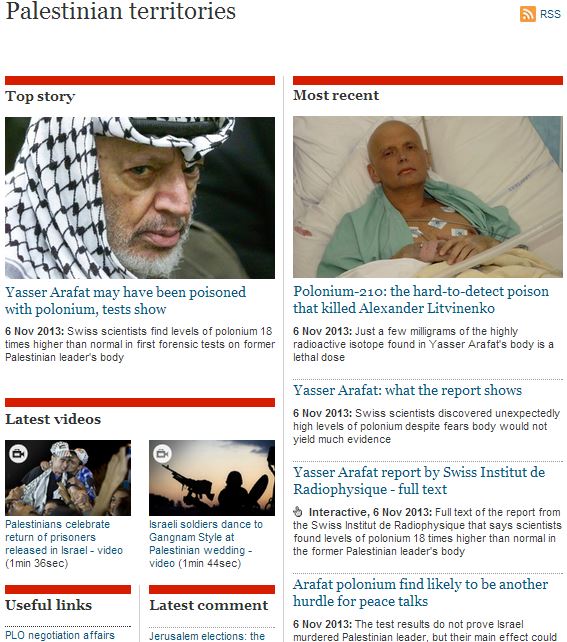On October 14th 2012 an interview with the BBC’s Middle East Editor Jeremy Bowen appeared in The Observer. In the course of the interview, Bowen brought up the subject of the incident in May 2000 in which his driver in Lebanon, Abed Takkoush, was killed whilst Bowen was covering the withdrawal of the IDF from South Lebanon.
“…in Lebanon [while covering the Israeli Defence Forces’ withdrawal from the country], my driver, Abed, was killed by Israeli fire. I’d been talking to my literary agent on the phone. I got out of the car. My driver was on the phone to his son. I walked away with my cameraman. There was a huge explosion. I looked round. The car was on fire. My driver was killed. The next day, two colleagues were killed in Sierra Leone. I had all the symptoms of post-traumatic stress disorder: flashbacks, nightmares, hypervigilance. I had counselling. It did help. I think I’m OK.”
Later in the interview, Bowen stated [emphasis added]:
“I’m haunted by the fact that when Abed was killed, I didn’t run back to the car. The Israelis would have killed me too if I had. But I still feel I let him down.”
The certainty with which that statement is made is significant. Bowen does not choose to say “I might have been killed”: he is sure about it – and he is sure about who would have done it.
One may well consider this understandable in light of the very real trauma a person must experience having gone through such an event, and it is surely a terrible belief to have to live with.
But given Bowen’s position as Middle East Editor – the gatekeeper of Middle East reporting – and his involvement in setting the curriculum for the Middle East module at the BBC’s College of Journalism, one must also wonder if Bowen’s belief still influences his outlook on the Middle East twelve years on.
One may also ask oneself how that belief is viewed by his colleagues. Do they too subscribe to Bowen’s convictions? Apparently some at least do.
In an essay written as a chapter for a book about journalists who died in Iraq published by the International News Safety Institute, veteran BBC presenter Nik Gowing wrote the following:
“There is a growing fear in our business that some governments – especially the most militarily sophisticated like the US and Israel – are sanctioning the active targeting of journalists in war zones in order to shut down what we are there to do – to bear witness and report what they are doing.
The fear is that an apparent culture of impunity by at least two nations is already actively encouraging others to believe they can get away with targeting and eliminating journalists, or at least turn a convenient blind eye to the issue. More than ever, we are inconvenient eyes and ears who monitor and report what some in power and command would much prefer we did not.”
That, of course, is a very serious accusation indeed, and not one which should be thrown about irresponsibly without concrete proof – which Gowing does not appear to be able to provide as his essay relies purely upon assumptions and conjecture.
It is also an accusation which those familiar with the IDF from the inside will find nothing less than incredible.
Gowing’s essay even goes on to suggest that Israel targets “peace activists” as well as journalists.
“Such warnings and criticisms have led to no reversal in Israel’s apparent policy of indifference not just to media operations, but also to the activities of humanitarian workers and peace activists in sensitive military areas. Indeed, the apparent culture of impunity that began before the start of Intifada 2 has deepened, judging by the escalating number of attacks in 2002/3. This includes a steadily intensifying rate of deaths by shooting with no subsequent detailed investigations, or at least anything made public.
In November 2002, an Israeli army sniper shot dead the UN worker Ian Hook inside a UN compound in Jenin. Months later there was no IDF explanation of what Hook’s colleagues called “cold blooded murder” . There remain similar grave questions in at least three other cases. Firstly after the peace activist Rachel Corrie sustained fatal injuries when she was knocked to the ground and crushed by a military bulldozer in Gaza.Two weeks later a US colleague Brian Avery was shot and seriously injured. Then there were the massive brain injuries sustained by the young photographer and peace activist Tom Hurndall after he was shot in the head during a protest in Gaza.”
Worryingly, Gowing’s unsubstantiated claims have been passed on to new generations of journalists studying in British universities, either as reading material or in lectures such as this one at the LSE in 2004 in which he stated:
“But the trouble is that a lot of the military – particularly the American and the Israeli military – do not want us there. And they make it very uncomfortable for us to work. And I think that this – and I am giving you headlines here – is leading to security forces in some instances feeling it is legitimate to target us with deadly force and with impunity.”
If the bizarre beliefs expressed by Jeremy Bowen and Nik Gowing are at all representative of the prevailing school of thought within the corridors of the BBC, then it is surely necessary to ask ourselves to what degree any BBC journalist can adhere to true impartiality on the subject of Israel if he believes, or has been led to believe by industry icons such as Bowen and Gowing, that the country is out to kill him and his colleagues.
Related articles
- Jeremy Bowen retweeting Joseph Dana (bbcwatch.org)
- To endorse, or not to endorse, that is BowenBBC’s question (bbcwatch.org)
- BBC ignores Gaza border attack (bbcwatch.org)




